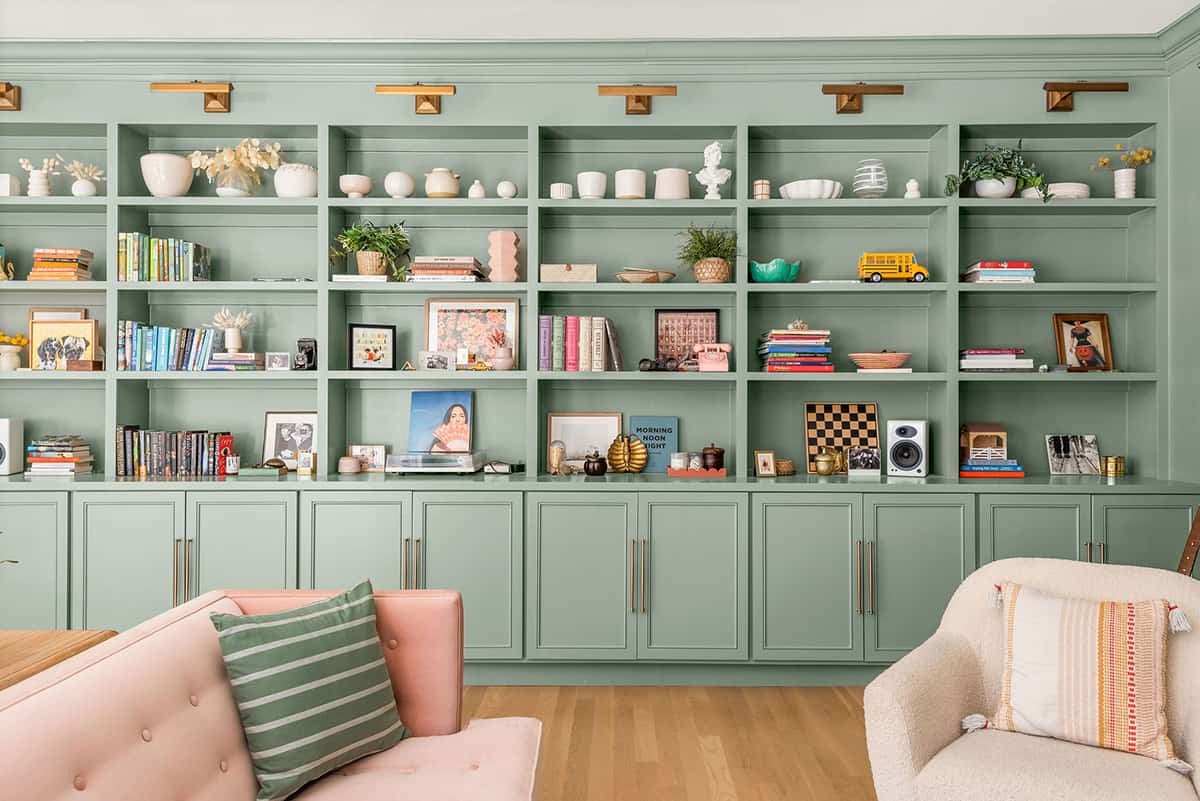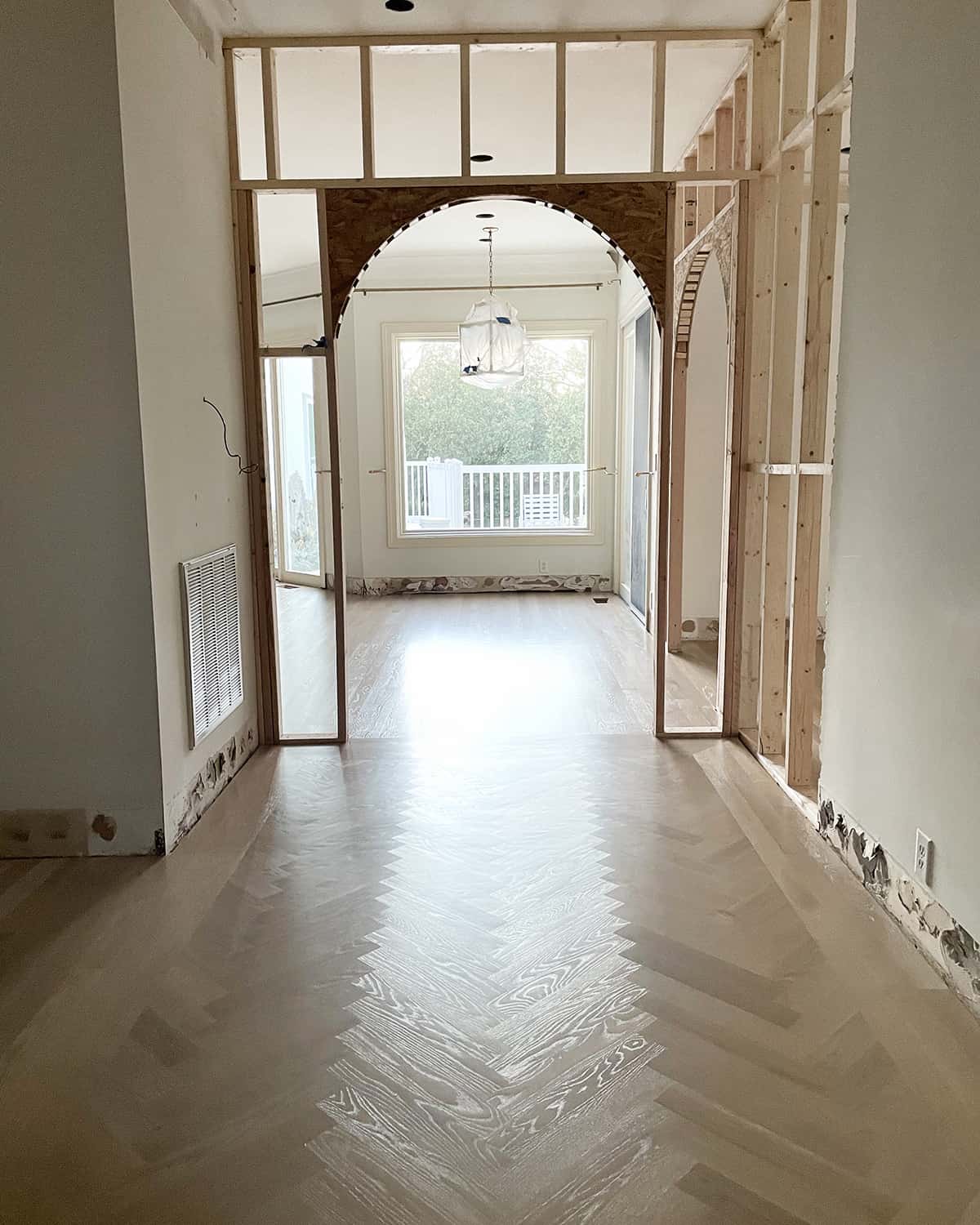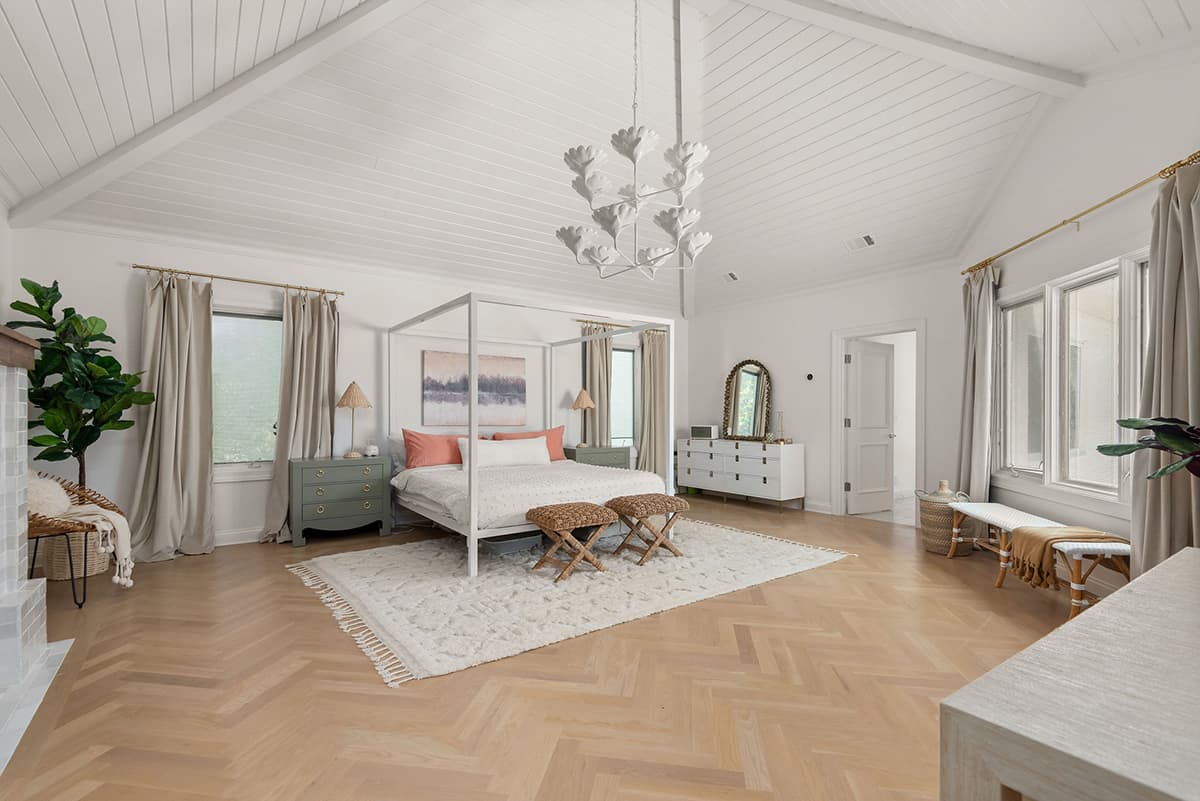For years, one of my most often asked questions is, “How do you find a good contractor?” There’s so much to it that I always felt kind of like, where do I begin.
We’ve been renovating homes nearly constantly for 10 years now. In that time, we made plenty of mistakes and learned lessons the hard way. In this post, I’ll share my personal tips for finding trustworthy contractors and managing them yourself.
I’ll also share how I search for new contractors and get the most accurate quotes. I’m so excited to share this with you as renovating has been a true joy to me and something I am very proud of. I’ll help you make your first experience as painless as possible.

The difference between a general contractor and tradespeople:
A general contractor is a project manager who manages all the work being done on your home. For most projects (for example, a kitchen or bathroom), if you want to be able to hire just ONE person who takes care of the entire project, you will need to hire a general contractor.
It’s rare that any contractor will do an entire renovation project solo (and it will likely be a longer timeline). A general contractor will oversee your project by planning it, hiring all the tradespeople needed, sometimes sourcing and buying needed supplies, and checking in daily (or frequently) to make sure everything is on track.
A tradesperson is someone who does one trade. For example, when you renovate even the smallest half bathroom, you may need a tile person, a wallpaper installer, a plumber and an electrician.
I recommend looking for tradespeople who specialize in one trade as they are often the most skilled and professional. I recommend working only with licensed contractors— especially on essential functions of the home like electrical and plumbing.
Pros and cons: The pro of working with a general contractor is that they will manage the project for you. You will have less responsibility and it can save a lot of time, especially if you don’t know any trades you like and you would need to hire everyone from scratch.
Another pro of a general contractor is that if a problem arises with a trade (often not showing up), it is their job to take care of it. If you are a person who hates confrontation, this is something to consider.
One last pro of a general contractor is that you will receive one quote that includes everything. It’s a quicker way to figure out the cost of your project. The cons of working with a general contractor are that their project management services, understandably, cost money.
The overall budget for your project will be at least 20% more, and in my experience, it was more than that.
For tradespeople, I will start with the cons. For me, the biggest con is all the hiring of new trades. There is an interviewing process (more on that soon) that is time consuming.
Anytime you are renovating for the first time in a new area, you have to find a new lineup of tradespeople who you like and trust. When starting a huge project, like a slow whole house remodel, it can be worth it to find all these people.
In my experience, when you find great trades you can work with them for years. The other major con of foregoing a general contractor is the added responsibilities of managing trades yourself. You will be responsible for paying them directly and working out any conflicts that may arise.
The biggest pro of working directly with trades is probably the budget savings.
My personal preference: In the early years of our renovations, we chose to work directly with trades and not a general contractor because it was the only option that fit our small budgets. As the years went by, I became familiar with the process and comfortable being the project manager.
I remember it being so stressful in the beginning, but over time I found a comfortable rhythm. These days, I love working directly with tradespeople and find it easier, faster, and less expensive to get exactly the outcome I want.
I am able to be honest immediately when I see something I don’t like or that is not going to plan. Developing good communication skills is a must. Since I became used to working directly with trades, it is now my preference for most small cosmetic projects.
I love that I can save some of my budget by self managing to splurge in other places. I would still hire a general contractor for projects I am inexperienced in and anything on the scale that requires a permit.
For major projects, there is also a hybrid approach to consider.
If you want a general contractor, and need to save budget, tell them you already have your own painter or floor person. Trades like that are the easiest to find a hire. That way, you’ll save a bit on the markup on a few of the highest budget items.

Tips for hiring a contractor or trades:
I am currently looking for a general contractor for some of the large scale work on our new home. Here’s how I searched:
- Ask people in your neighborhood if there are any trusted teams that work there a lot.
- My ideal contractor is always one with a medium price point. I never look for the cheapest contractors because they often get more expensive with time and bring too much personal drama into my project.
- If the price is shockingly low, be very cautious. In my experience, I am looking for someone who tells me a real price that has reasoning behind it. For things like wood floors and tile there is usually a price per square foot. For things like custom built-ins, the price may be more obscure to you, and that is normal.
- In my experience, the medium priced contractors are the true best priced option and it’s usually best to go with the reasonable price instead of the bargain.
- Ask people in your neighborhood for specific trade recommendations. Do you have a plumber you like?
- Ask people what contractor team specializes in your type of home (historic? mid-century? new build?).
- Ask every person you know who has renovated in the past five years. Ask specifically Would you hire them again after your experience with them? and What are their strengths and weaknesses? No renovation is perfect, so it’s good to find out how their handled mistakes and challenges.
Let’s talk interviewing. I consider the first appointment both an opportunity to get a quote AND and interview on my part. I’ve learned that the best contractors will also be interviewing you to see if you will be a good client (more on how to prepare below).
Once you have a shortlist of a few GCs or trades you want to interview (I would do two or three interviews/quotes for each role you are filling), it’s time to prepare for your first appointment.
One of the biggest mistakes you can make is to ask for a quote and nothing else. This is your chance to try to learn more about how they operate and what to expect. Here are some good things to consider asking for:
- Photos of similar projects they are proud of, or really any photos they are proud of. Let them show you what they are best at.
- A couple references of local houses you can call. Often they will even try to arrange to let you see their renovation in person.
- Ask – What precautions do you find help most to keep a project on budget?
- Ask – What hidden costs do you foresee in my renovation?
- Ask – What is your usual timeline like? What are some ways we can keep our project on schedule?
- Tell them you need to agree on a payment schedule at the beginning that is supply costs up front and then a payment each time a mile marker on the project is completed.
Try a test project. Before you hire a contractor to do a big renovation, hire them to do something smaller. I would especially recommend this for anyone gearing up for a large or full house renovation.
If you have a chance to do something smaller first—just a bathroom, for example, you will be able to make sure you like the team and work well together before jumping into a bigger commitment together.
A sexism pep talk for women. Navigating sexism is something that has come up often for me as a woman hiring primarily men contractors and tradespeople. Many (many) times male contractors have walked into our home for the first time, taken a look around and ask, “What does your husband do?”
It’s absolutely shocking and never OK, but for me it has also been a necessary evil. I see it as accepting the world I live in, not the world I wish I lived in. To be fair, I have worked with many respectful men, but here are my tips for when sexism does arise:
- My husband and I let them know clearly that I am the one in charge and that he doesn’t need to OK anything. My husband intentionally doesn’t weigh in on opinions and asks me what I think in front of a new contractor to set the tone. His answer for everything is, “You’d better ask Elsie.”
- By being very prepared for your first quote meeting you will show them that you are serious and you know exactly what you want.
- One of the major things I run into is contractors trying to talk me into and out of choices. Often they have good intentions and are just trying to do for you what they usually do. While it’s good feedback about items like safety or function, it’s frustrating to be repeatedly questioned on design choices. Now I always prepare for this with lots of photos.
- Never let a contractor talk you into something you don’t want or don’t like just because you feel put on the spot. Say you need a day to think it over.

How to prepare to get a quote:
When we did our first big remodel, I was ghosted by contractors a lot. They would come to my house to give me a quote and then I would never get the quote and never hear from them again. Years later, I realize that I was the problem.
When a contractor showed up at my house, I would be unprepared and just walk through the house with them talking about how I wanted each room to look. Often I didn’t even know exactly what I wanted, but I still expected them to send me a quote.
Contractors do not want to work with people who are still deciding what they want. They want a project that is understandable and ready to begin in a certain time frame.
The other mistake I made in early years was never saying my budget. I was so focused on trying to get a good deal that I mistakenly believed that not saying my budget would bring me a lower quote.
Contractors cannot read your mind and with good contractors the prices are not really negotiable. It’s unfair to invite a contractor over to get a quote without having at least a ballpark budget of what you are hoping to pay.
In fact, I have often found it more helpful to say your true IDEAL budget as many contractors will try and help you adjust the scope of your project to fit your budget. It’s a good starting point and helps you get on the same page.
All the things I prepare before meeting with a contractor:
I have found that fully preparing (some would say over-preparing) helps me get the most accurate quotes and have a more productive first meeting with a new contractor.
It also shows them that I will be a responsible client and good communicator. I like to take my time and spend at least a few nights preparing all the visuals and examples before meetings begin.
- Sketches of how I want my project to look (be as detailed as possible).
- All of my sources are picked out. Currently, I am preparing for a bathroom quote and I chose the vanity, tub, all the hardware, the tile, and even the toilet before my first meeting with a potential contractor.
- Visual examples. Pinterest photos that show all the details of your project. This is not a mood board where the colors and vibe matters—–this is a way to communicate if you want your tile installed a special way or you want an arched door added.
- Never assume they can see what is in your head. Always double communicate by showing examples.
- Know your ideal time frame. They will always want to know when they can start and when you need it done by. If you are renovating before moving into a new house, I recommend saying everything “needs” to be done one to two months before you move in. Delays are normal and you will want a chance get it cleaned up before moving in.
- Know your budget. Know the lowest price you are hoping to pay as well as the highest you are willing to pay for a job.
When I first started renovating, I was always afraid to seem high maintenance or fussy, when really those words are just synonyms for being very detailed and invested in my renovation.
Now, I don’t try to mask those qualities. I let contractors know that I do care about the details. There’s nothing wrong with that. It’s far better for everyone involved to be extremely specific about what you want than to go into a project without a plan.
How to budget for overages and the unexpected:
You’ve probably heard to old advice, “It will cost twice as much and take twice as long as what they say.” This was definitely true for the bargain contractors I hired early on in my renovations.
I haven’t found it to be true across the board, though. Unexpected expenses will pop up! Here are some things to keep in mind:
- Contractor quotes don’t include unexpected problem-solves in their quotes. We have had them on almost every gut renovation we’ve ever done. Sub floors are rotten and need replaced, hard woods aren’t salvageable and need to be replaced, mold is found and has to be remediated. These types of problems are common.
- There are usually more supplies than you anticipate. Little things add up, even if you are careful.
- My personal problem is that I usually keep adding ideas on after I have my quote, which adds expenses.
Here’s how I keep myself on budget and also always have funds to cover for an unexpected expense:
- Always keep at least $10K or 20% (whatever is more) on hand for unexpected expenses. You just never know. It’s up to you how much overage you prepare for.
- I recommend always having a healthy mini emergency fund that is designated for your renovation. Once a room is gutted, you really have no choice but to put it back and you need to be prepared to pay for unexpected repairs and expenses.
- Schedule your renovation from most to least important. If you are on a tight budget, it’s smart to do your “big win” renovations first. These are essential repairs, kitchen, and bathroom renovations for most homes. Then you can do your “nice to have” items next, like adding a new porch or adding a bunch of wallpaper.
- In my budgets, I always know which items I will cut from my plan if I begin to go over budget.
- As I alluded to above, there is a correlation between hiring experienced, reputable contractors and staying on budget. I would rather cringe at the price up front and stay on budget than go way over the bargain budget I was told. Reasonable quotes for the win!

I really enjoyed sharing this and I hope it helps some of you avoid some of the pitfalls and mistakes I made in the past. Ultimately, renovating is usually a challenging process with a big reward at the end.
Keep your chin up, keep your eye on the prize, and don’t beat yourself up over things you can’t control. It’s normal to feel completely burnt out near the end of a renovation, and in my experience it fades quickly as soon as you are completed.
What to see some of my renovation projects?
If you have any useful renovation tips, I’d love to hear them in the comments! Elsie
